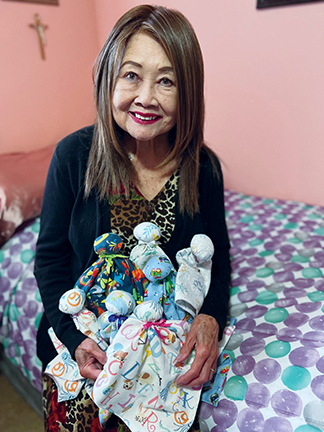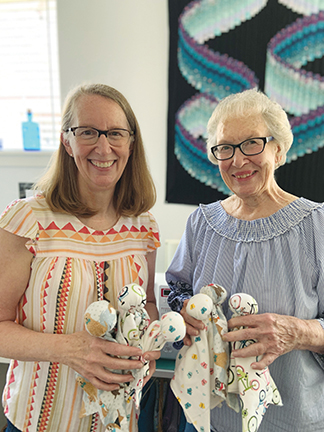By LISA EISENHAUER
When the neonatal intensive care unit team at Providence St. Vincent Medical Center in Portland, Oregon, decided about a decade ago to research how to advance their care of micro-preemies, Kati Knudsen says one finding that repeatedly popped up was how
comforting maternal scent is.

Knudsen
The research prompted the team to immediately start making use of "lovey dolls" to capture that scent and keep it next to the tiny infants, who were out of the womb in what is typically just the second trimester of a pregnancy.
"We were going to do kind of a major rollout like six months later of a lot of things to do with small baby care, but the literature was so strong around maternal scent that we thought we couldn't wait and that we needed to get these into our unit quickly,"
Knudsen recalls.

Winnie Jones holds a batch of lovey dolls she sewed as a volunteer at PeaceHealth Sacred Heart Medical Center at RiverBend in Springfield, Oregon. New parents of sick babies keep the dolls close to their skin to pick up their scent. The scented dolls
provide comfort for incubated babies.
She is now lead physical therapist of inpatient pediatrics and NICU at Providence St. Vincent and at Providence Portland Medical Center. For the last several years, the NICU teams at both hospitals have given parents packets with two of the little flannel
dolls to keep next to their skin overnight or at least for several hours. The dolls rest close to babies in their incubators.
Evidence-based practice
Knudsen says studies have indicated that maternal scent helps with parent-newborn bonding, the establishment of breastfeeding and with infants' physiological stability.
One such study was published in 1998 in the journal Biology of the Neonate. It found the presence of a mother's odor seemed to help enhance nipple
acceptance and feeding in newborns and diminish crying for distressed infants. A study in the journal Breastfeeding Medicine in November 2020 concluded
that the smell of breast milk may be helpful in reducing the pain of newborns during heel-prick blood sampling.
Knudsen says that while the scientific findings aren't as robust when it comes to whether the scents of fathers or other non-gestational parents have physiological effects on newborns, those odors do seem to help with bonding.
The Providence NICU teams shared their lovey doll pattern with PeaceHealth Sacred Heart Medical Center at RiverBend in Springfield, Oregon. That hospital has been giving lovey doll packets to parents of its NICU patients for about five years.

Dockey
Nadine Dockey, a physical therapist in PeaceHealth Sacred Heart's NICU, says smell and taste are among the first senses to develop in utero. "By 28 weeks the infant can recognize smell," she explains. "They start to recognize mom's smell, dad's smell
and that's closely related with the limbic system and the amygdala, parts of the brain tied to emotion and memory."
Dockey says that in addition to the various physiological effects that studies seem to point to, placing the scent-infused doll a whiff away from the babies generally has a calming effect on them.
Comfort in connection
A lovey doll can have a soothing effect on parents, too. Dockey says moms and dads find comfort in knowing that their scent is relaxing their infants during the times when the babes can't be in their arms.

Karin Larson, a registered nurse at Providence Portland Medical Center in Oregon, and her mother, Pat Sandberg, make lovey dolls for the hospital.
"Parents can feel helpless in this situation where things did not go maybe according to their plan," Dockey says. "So, the dolls give parents some control back and some power back in caring for their baby."
The lovey dolls are made by volunteers at all three Oregon hospitals. At PeaceHealth Sacred Heart, most of them are made by Winnie Jones with material provided by the hospital. She stitches the soft flannel squares together, stuffing them with
cotton and tying off the middle section with ribbons.
She started making a few of the dolls every week about four years ago. With the onset of the COVID-19 pandemic, she picked up her pace. Now she makes as many as 24 a week. "While I sew these, I say a little prayer for the babies who receive them
and it just makes me feel good doing this," says Jones, who lives in Eugene, Oregon.
Once the preemies are discharged, the dolls go home with the families as keepsakes. Before the pandemic, Providence Portland hosted annual reunions for NICU families. It wasn't unusual for parents to tell the NICU nurses that the children even
as toddlers were still attached to the toys.
Nurse, mother team up
Providence Portland's lovey doll supplies used to come from various volunteers, including Girl Scout troops. In recent years, Karin Larson, a registered nurse in the hospital's NICU, and her mother,
Pat Sandberg, have been making all of them.
Larson says she and her mother took over doll production when quality became an issue. "They weren't standing up to repeated laundering," she explains.
She and her mother get together every few months to make the dolls. Her mother, who is 86, handles the part that requires a sewing machine and Larson does the rest. They produce 30-40 dolls at a time.
"They are quite labor intensive, I will say, for as simple of an item as they look," Larson says. "We work for hours just to make one batch."
It's a labor of love for the duo, bonding them much as the dolls bond the newborns and parents in the NICU.
"It's a fun mother-daughter time for us to connect and visit," Larson says. "It's lovely."
Copyright © 2022 by the Catholic Health Association of the United States
For reprint permission, contact Betty Crosby or call (314) 253-3490.